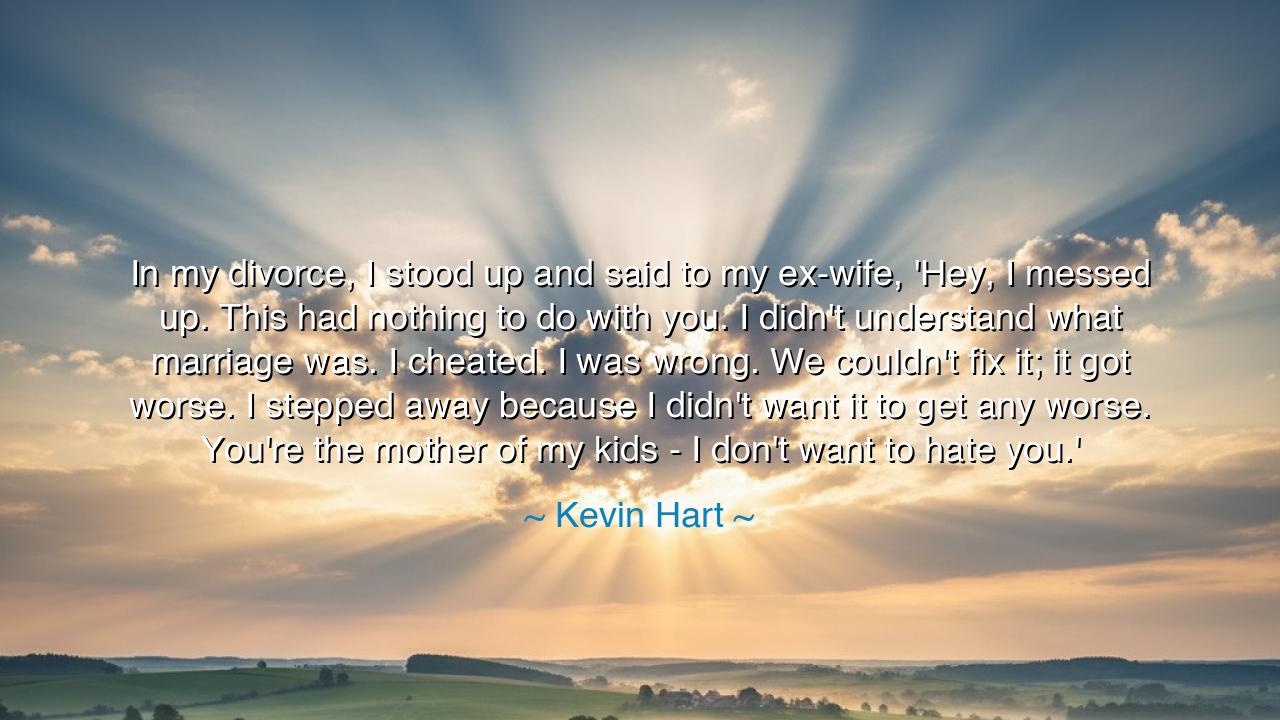
In my divorce, I stood up and said to my ex-wife, 'Hey, I messed
In my divorce, I stood up and said to my ex-wife, 'Hey, I messed up. This had nothing to do with you. I didn't understand what marriage was. I cheated. I was wrong. We couldn't fix it; it got worse. I stepped away because I didn't want it to get any worse. You're the mother of my kids - I don't want to hate you.'






Kevin Hart, in a moment of honesty and humility, declared: “In my divorce, I stood up and said to my ex-wife, ‘Hey, I messed up. This had nothing to do with you. I didn’t understand what marriage was. I cheated. I was wrong. We couldn’t fix it; it got worse. I stepped away because I didn’t want it to get any worse. You’re the mother of my kids—I don’t want to hate you.’” These words are heavy with sorrow, but they are also a testimony of courage—the courage to admit fault, to speak truth, and to release bitterness before it consumes both hearts.
When he says, “I messed up,” Hart reveals the ancient wisdom that responsibility is the first step toward redemption. Many in the throes of separation hurl blame like stones, seeking to shield themselves from guilt. But he chose another path: to acknowledge his failure openly, and in so doing, he regained the dignity that only truth can give. For it is written in the lessons of old, “He who confesses his fault is greater than he who conquers a city.” Hart’s confession, raw and unguarded, is not weakness—it is strength born of humility.
His admission, “I didn’t understand what marriage was,” echoes across centuries of human experience. For marriage is no simple arrangement of companionship; it is a covenant, demanding patience, sacrifice, and wisdom. Many enter it thinking it a perpetual feast of joy, only to find it is also a crucible of discipline. Hart’s failure was not in his desire for love, but in his lack of understanding of its weight. In confessing this, he gives voice to countless men and women who have stumbled on the same path, blinded by passion but unprepared for responsibility.
The most striking part of his words comes in his refusal to let hatred grow. “You’re the mother of my kids—I don’t want to hate you.” Here lies the heart of maturity: to separate the brokenness of the couple from the dignity of the parent. Too often, children suffer when former lovers allow bitterness to reign. But Hart, though wounded and guilty, chose a higher way: to honor his ex-wife for the sacred role she still holds, and to preserve peace for the sake of his children. This is not merely personal wisdom; it is the wisdom of every civilization that seeks harmony over vengeance.
History offers us examples of this truth. Consider Abraham Lincoln, who though scorned and mocked by his rivals, often spoke of them with restraint and forgiveness. He declared, “Do I not destroy my enemies when I make them my friends?” Though Hart’s context is marriage, the principle is the same: enmity destroys, but dignity preserves. To forgive, or at least to refuse hatred, is to plant seeds of peace that may one day grow into reconciliation—not of marriage, but of respect.
The meaning of Hart’s confession is therefore both personal and universal. It teaches that brokenness does not have to yield to bitterness, that failure does not have to harden into hate. By admitting his own sins, he liberated his ex-wife from blame and freed himself from the chains of self-deception. In this act of painful honesty, he demonstrated a truth the ancients often proclaimed: that courage is not only found in battlefields, but in the quiet acceptance of one’s own wrongs.
The lesson for us is clear: when you fail, acknowledge it. When you wound another, admit it. Do not let pride forge walls of bitterness, for they will imprison you as much as the other. And if love cannot survive, let respect endure—for the sake of the children, for the sake of peace, for the sake of your own soul. Marriage, even when it fails, can still teach; divorce, even when painful, can still yield wisdom if faced with truth.
Thus, Kevin Hart’s words, born of regret, are also born of light. He reminds us that to confess is not to fall lower, but to rise higher; that to release hatred is not weakness, but strength; and that even in the ruins of marriage, one can build a legacy of dignity, respect, and love for the generations yet to come.






AAdministratorAdministrator
Welcome, honored guests. Please leave a comment, we will respond soon